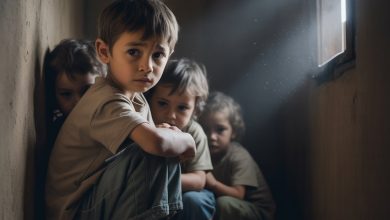The Whisper Through the Fence: How One Neighbor’s Courage Exposed a Horrifying Secret
The wailing of sirens tore through the suburban silence, a sound so alien to this quiet street that it felt like a violation. The noise bounced off the pale, neatly painted facades of the houses, and red and blue lights stuttered across the perfectly manicured lawns, chasing frantic shadows that danced across the broken blinds of the gray house next door. Rosa Alvarez knelt on her own front porch, her arms wrapped tightly around the small, shaking boy in her lap. His skin was cool and damp against her chest, his breath coming in ragged, shallow bursts.
Somewhere behind her, Officer Mendes barked clipped, urgent instructions into his radio. The social worker, a kind-faced woman named Miss Benson, walked out of the gray house’s front door, carrying a small, trembling girl, Ava. But Rosa barely registered any of it. The chaos, the officialdom, the sudden, sharp intrusion of the outside world—it was all just background noise. All she could hear was the soft, muffled voice pressed against her collarbone.
“You believed me.”
And for the first time in years, Rosa cried. Not out of fear or frustration or the lingering guilt of her own past, but out of a quiet, soul-deep relief that felt as heavy and as cleansing as a summer rain.
Forty-eight hours earlier, the neighborhood had looked nothing like a crime scene. It was a Wednesday, and the sun was thick and golden, spilling over the rooftops in warm, lazy waves. Children’s bicycles lay toppled beside driveways, forgotten in the heat of the afternoon. The distant, rhythmic buzz of lawnmowers provided a soothing soundtrack, and somewhere nearby, a windchime whispered its delicate, metallic tune to the breeze. It was a portrait of peaceful, American suburbia.
Rosa Alvarez was on her knees by the fence that separated her yard from the gray house, pruning her rose bushes as she did every Wednesday. Her garden was a riot of color, the most vibrant on the street, though she would never brag about it. The flowers were her therapy, her sanctuary. Each petal, each thorn, each burst of life was a quiet reassurance that beauty could still grow, even in cracked, unforgiving soil. Her hands, clad in old, worn leather gloves, moved with a practiced rhythm, snipping away wilted leaves and dead blossoms. The scent of rich earth and chlorinated hose water filled the air, mixing with the lingering aroma of the sourdough loaf she had baked that morning, now cooling on her kitchen counter.
She didn't hear him at first. It was more of a flicker in the corner of her eye, a subtle disruption in the familiar pattern of her afternoon. Something small, something blue, a fleeting blur behind the black iron fence. She paused, shears in hand, and looked up. There he was again. Owen, the little boy from the gray house. He stood half-shadowed behind a clump of overgrown hedges, so still and silent he could have been a lawn ornament. His oversized blue t-shirt clung to his thin frame like a borrowed skin, the sleeves dangling far past his wrists despite the warmth of the day. His face was pale, thinner than she remembered from the last time she’d seen him, weeks ago. He hadn’t said a word then, either. He had just stared.
“Mijo,” Rosa said softly, her voice warm as she slipped off her gloves. “Are you okay over there?”
The boy flinched. Not a small startle, but a full-body jerk, as if someone had touched a live wire to his skin. His hazel eyes, far too large and old for his small face, widened in panic. They darted left, then right, then locked on a window of the house behind him. A beige curtain twitched, just for a second, then was still.
Rosa saw his throat move as he swallowed hard against something that wasn't just saliva. When he finally spoke, his voice was a gravelly whisper, thin and dry, like a thing that was rarely used.
“She locks us in the basement.”
The world slowed to a crawl. The hum of the distant lawnmower faded. The gentle whisper of the windchime fell silent. Rosa didn’t blink. She didn’t breathe. The words hung in the warm, sunlit air between them like a bruise waiting to darken.
Owen continued, his voice barely rising above the rustling of the leaves at his feet. “When we break things… or cry too much.”
A cold, sick feeling coiled in Rosa’s stomach. Her fingers tightened around the cool iron of the fence rail until her knuckles turned white, but she forced her voice to remain soft, measured, safe. “Does your mom do that, sweetheart?”
A floorboard creaked from inside the house behind Owen. A shadow passed by the hallway window. The boy froze, his small body rigid with terror. He took a clumsy step back, then another. As he stumbled and fell, his oversized shirt lifted just enough for Rosa to see it: a faint but undeniable purple band circling his waist, like the ghost of a belt wrapped too tightly, or too often.
“Don’t tell,” he whispered, his eyes welling with tears that threatened to fall but didn’t. He scrambled back to his feet. “Please. She says… if we tell, the punishments get worse.”
And just like that, he turned and ran, disappearing into the shadows of his own home.
Rosa remained by the fence, motionless. Only her breath betrayed the storm raging inside her. It was slow, uneven, a painful hitch in her chest. She stared at the spot where he had stood, at the unforgiving iron fence, at the curtain that was now drawn tightly shut. The house didn’t look sinister, not from the outside. The lawn was trimmed, the windows were clean. But now she saw the things she hadn't let herself notice before. The way the blinds never opened fully, always angled down as if to keep the world out, or something else in. The dent in the mailbox, as if it had been struck in a fit of rage. The porch light that flickered erratically, as if undecided whether to stay lit or surrender to the darkness.
She realized with a jolt that she had never heard laughter come from that house. No sounds of television, no radio, no life. Just a heavy, vacuum-like silence. Her eyes moved to the yard. No toys, no chalk drawings on the driveway, no swing set. Only an overturned plastic bucket filled with stagnant rainwater and decaying leaves. Nothing that said a child, let alone two, actually lived there.
She pressed a palm to her chest, the rhythmic thud of her heart feeling too loud. Her brother’s voice, a memory from years ago, echoed in her head. There are always signs, sis. You just have to know how to look. Miguel had said that after his last child abuse case, a five-year-old girl found locked in a closet. Rosa remembered the look on his face when he told her, the way his steady hands trembled. Now she had seen a sign herself. And doing nothing was no longer an option.
The next morning, Rosa stood in her sun-drenched kitchen, staring at a mug of coffee that had long since gone cold. Outside, the street was its usual sleepy self, but inside Rosa, a silent war was being waged. She had been pacing since dawn, her floral apron still on, speckled with flour from a baking attempt she’d abandoned halfway through. Every few minutes, she would find herself at the window, her gaze drawn inexorably to the gray house. No movement. Just that same curtain, slightly askew, like a lazy, half-closed eye.
She needed a reason to go over there, a plausible excuse to see inside, to see the children. She reached for a mixing bowl. Cookies. Chocolate chip. Everyone accepts cookies, right? It was a neighborly gesture, a Trojan horse made of butter and sugar.
When the cookies were done, slightly too brown around the edges from her distracted baking, she arranged them on her best plate. It was only twenty steps from her front door to theirs, but each step felt like a mile. The neighbor’s gate creaked in protest. The dented mailbox stood like a silent, metal scar. She climbed the three porch steps, took a steadying breath, and rang the bell. It chimed with a bright, cheerful, dissonant sound, which was then swallowed by silence.
She waited. One second, two, five. She heard footsteps, slow and deliberate. The door swung open.
A woman stood there. She was blonde, dressed in a floral summer dress, and her smile was too wide, too bright, a carefully painted mask. “Yes?”
Rosa’s own smile felt brittle, fragile. “Hi, I’m Rosa, from next door. I was baking and made some extra cookies.”
From behind the woman, a flash of a blue shirt. Owen. His face went bone-white the moment he saw her. The woman’s hand, as if by instinct, clamped down on his small shoulder. Rosa noticed her fingernails, painted a sharp, perfect pink, digging into the fabric of his shirt.
“How polite,” the woman said, her voice tight despite the smile. “But really, that’s not necessary.”
Rosa didn’t move. She held the plate out a little further. “Just a welcome-to-the-neighborhood gesture, even though you’ve been here a while. I love children. Maybe Owen and his sister could come by sometime, help me in the garden.”
The woman’s name was Chloe, and her face hardened almost imperceptibly. “My son doesn’t bother the neighbors.” And then, as she began to close the door, Rosa saw it. Down the dim hallway behind her, a door at the very end of the hall. It was closed, but unlike the other doors, this one had a heavy, industrial-looking padlock on the outside.
“Of course,” Rosa said, her mind reeling. She forced a final, polite smile. “Of course, I understand.”
But as she turned to walk away, she heard it. A soft, muffled sob from deep within the house. And Rosa knew, with a certainty that settled in her bones like ice, this wasn't just a bad feeling. This was a child in danger. And she was the only one who had heard his whisper.




